The noted female impersonator Charles Pierce is invited to visit to the home of Norma Desmond (of Sunset Boulevard [Billy Wilder, 1950]).
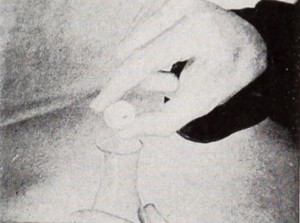
"In order to acquaint university students with courses of study other than those which they pursue, Mervyn V. Miller has filmed The School of Physical Sciences. In so doing, he has given each department significant and generous footage to display its particular factors. The result gives other students a general understanding of an activity which otherwise might remain obscure to them. Mr. Miller's project is believed to be the first of its kind. He presented it as a thesis for a doctorate. The film is intelligently planned, edited and executed in such a way as to introduce the student to the unusual features, as well as the commonplace facts, of each of the physical sciences of the school. Through the shrewd handling of the script, the picture is developed as an excellent medium of orientation." Movie Makers, Dec. 1944, 496.
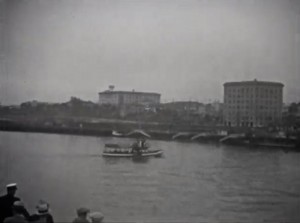
"Footage of various places in Southern California and Mexico." Archive.org
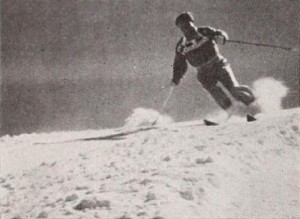
"A Ski Story, by Albert E. Sigal, has been two years in the making — but it has been well worth the effort. Laid against the scenic grandeur of Yosemite National Park, the picture is eloquent testimony both to the thrills and the dynamic beauty of the sport of skiing. Mr. Sigal begins his story slowly with an introductory sequence which sets the mood of the piece. Sequences then follow in leisurely progression of the activities of the ski school, the joys of a hot lunch served alfresco beside the clubhouse, down mountain racing and cross country rambling. Mr. Sigal's consistently good color cinematography benefits to a degree by the clarity of the Western air, a boon so often denied to skiing movie makers on Eastern slopes." Movie Makers, Dec. 1943, 477.
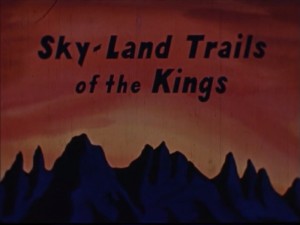
Subtitled: a story of happy days in Kings Canyon National Park.
"The story of the common brown land snail, found in California and other parts of the U.S." Oldfilm.org
"Springtime in California, by F. B. Judson, ACL, is an example of what every Kodachrome filmer would be proud to have made, because it studies Nature in her most extensively colorful manifestations, with complete freedom of camera viewpoint, offering closeups, medium shots and long views, all of them richly hued. This film indicates a delicate appreciation of color on the part of its maker, who. having a highly chromatic subject to his hand, did not let it run away with him. but kept it well under control, with the result that he delights with his management of pastel shades, where another might have omitted these and substituted garish footage so easily available in the highly colored California landscape. Mr. Judson is awarded Honorable Mention because he has done a typical thing — a Kodachrome landscape study — with restraint and liveliness, combining two qualities not always found together." Movie Makers, Dec. 1935, 553.
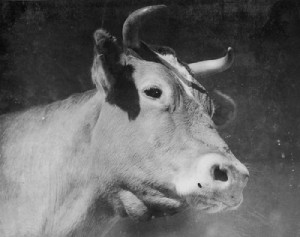
"In this feature length publicity picture, Mr. Judson has portrayed, with unfailing technical excellence and a genuine feeling for smooth cinematic design, the birth and growth to maturity of the famous Adohr Guernsey, Linetta, judged grand champion of her breed at the California State Fairs of 1935 and 1936. Save for the fact that practically all the scenes take place on Adohr farms and ranches, the film is devoid of advertising as it tells a simple and satisfying story, replete with human interest." Movie Makers, Jan. 1937, 24.
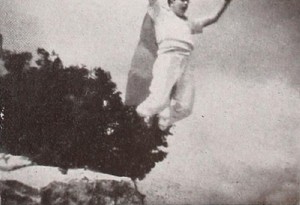
"Donald H. Kelly has cast a comic strip character in Superman Goes West, integrating travel sequences and comedy with great success. While the magnificent cinematographic record of a Western trip is the most engaging factor of the film, the entertainment value of the Superman motif cannot be minimized. The fictional hero is shown to be the consuming interest of a small boy passenger on the trip. The lad proceeds to read Superman comics under varying conditions, despite a changing background of allegedly awe inspiring scenery. One dream sequence with a Superman flavor is a triumph of trick cinematography." Movie Makers, Dec. 1943, 478.
"Three of Everything, the winner in Class C, is a cross section view of the advantages, equipment and materials the junior high school student finds today in a modern educational institution. Filmed at Mr. Gleason Junior High School in Sunland, Calif., the film depicts the print shop, the wood shop, the metal shop, the foundry, physical education, cooking classes, math and science, and finally graduation. With so much to assist his learning years, the film rightfully concludes that each student has, indeed, had three years of everything" PSA Journal, Sept. 1965, 51.
Total Pages: 7